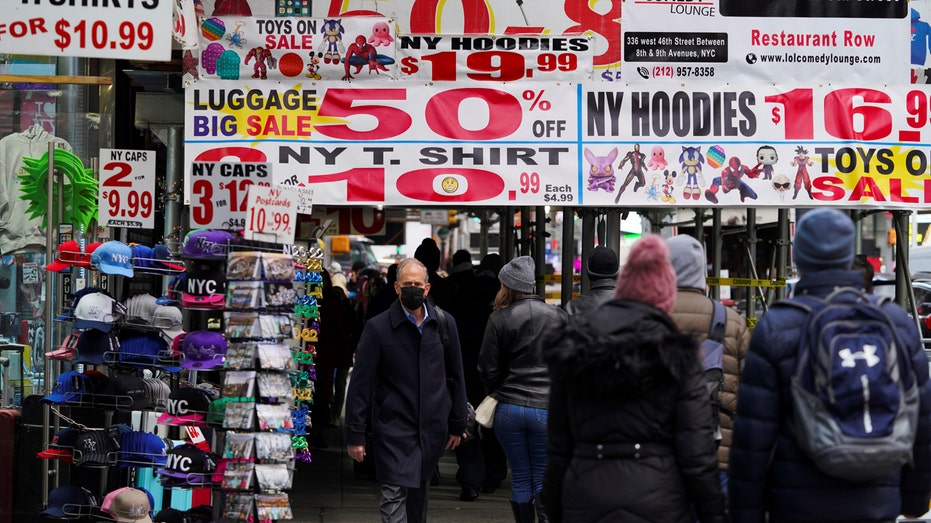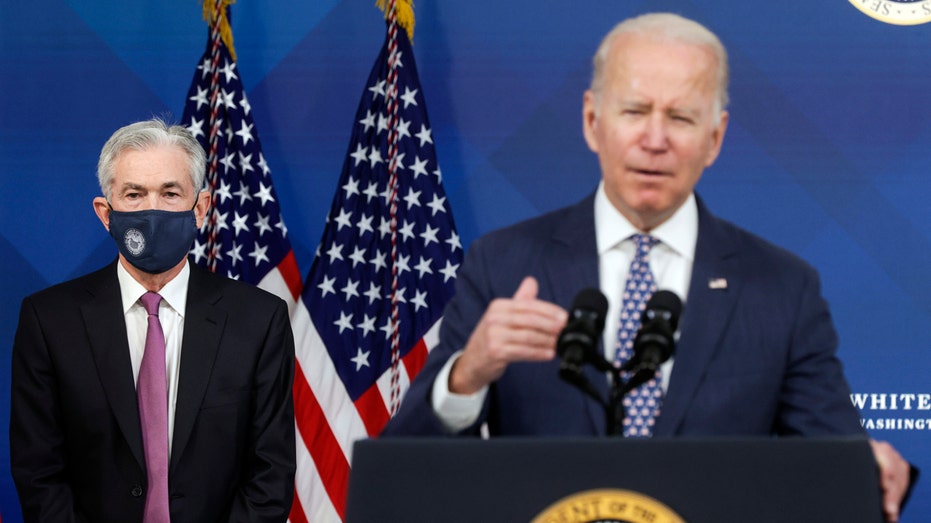US inflation surges to 39-year high as consumer prices soar
It was the fastest pace in nearly four decades
Futuristic stock picks amid runaway inflation
Phil Flynn of The Price Futures Group and Sarge986 President Stephen Guilfoyle provide their best stock plays on 'The Claman Countdown.'
Consumer prices surged at the fastest pace in nearly four decades in November as Americans paid more for practically everything from groceries to cars to gasoline, solidifying hot inflation as a key trait of the economic recovery.
The consumer price index rose 6.8% in November from a year ago, according to a new Labor Department report released Friday, marking the fastest increase since June 1982, when inflation hit 7.1%. The CPI – which measures a bevy of goods ranging from gasoline and health care to groceries and rents – jumped 0.8% in the one-month period from October.
MANCHIN SOUNDS ALARM ON INFLATION AS CLOCK TICKS FOR DEMOCRATS ON HUGE SPENDING BILL
So-called core prices, which exclude more volatile measurements of food and energy, soared 4.9% in November from the previous year – a sharp increase from October, when it rose 4.6%. It was the steepest rate since 1991.
Economists expected the index to show that prices surged 6.8% in November from the year-ago period and 0.7% from the previous month.
Price increases were widespread: Energy prices jumped 3.5% in November and are up 33.3% year over year. Gasoline is a stunning 58.1% higher than it was a year ago. Food prices have also climbed 6.1% higher over the year, while used car and truck prices – a major component of the inflation increase – are up 31%.

People walk past advertisements near Times Square in New York, the United States, Dec. 7, 2021. (Photo by Wang Ying/Xinhua via Getty Images / Getty Images)
The Labor Department said the increases for food and energy were the fastest 12-month gains in at least 13 years.
Rising inflation is eating away at strong gains and wages and salaries that American workers have seen in recent months – bad news for President Biden, who has seen his approval rating plunge as consumer prices rose. The White House has blamed the price spike on supply-chain bottlenecks and other pandemic-induced disruptions in the economy, while Republicans have pinned it on the president's massive spending agenda.
Biden looked to downplay the November inflation figure before its release, saying in a statement on Thursday that the data would not reflect the decline in gas prices. He stressed that passing his $1.7 trillion social spending and climate plan is necessary to help lower costs.
"Fortunately, in the weeks since the data for tomorrow's inflation report was collected, energy prices have dropped," Biden said in a statement. "The information being released tomorrow on energy in November does not reflect today's reality, and it does not reflect the expected price decreases in the weeks and months ahead, such as in the auto market."
GET FOX BUSINESS ON THE GO BY CLICKING HERE
The eye-popping reading – which marked the sixth consecutive month the gauge has been above 5% – could threaten the passage of the Build Back Better bill, however: Sen. Joe Manchin raised concerns this week about soaring inflation and refused to commit to supporting his party's massive social spending and climate plan until he sees the final text of the $1.7 trillion spending plan.

People buy food at a holiday market in New York, the United States, Dec. 7, 2021. U.S. annual inflation will remain above the Federal Reserve's target of 2 percent over the next three years amid rising wages and strong demand for goods and services, (Photo by Wang Ying/Xinhua via Getty Images / Getty Images)
"The unknown we’re facing today is much greater than the need that people believe in this aspirational bill that we’re looking at, and we’ve got to make sure we get this right," Manchin, D-W.Va., said during a Wall Street Journal CEO summit. "We just can’t continue to flood the market, as we’ve done."
The reading will also have major implications for the Federal Reserve, which is holding its two-day, policy-setting meeting next week. Though central bank policymakers initially downplayed rising inflation as "transitory" and likely to abate as supply-chain disruptions cleared up, Chair Jerome Powell shifted his tone last week to acknowledge the increase has been higher and longer-lasting than policymakers expected.
Fed officials have started to suggest they may have to react to rising prices by speeding up their withdrawal of pandemic support for the economy.
CLICK HERE TO READ MORE ON FOX BUSINESS
"At this point, the economy is very strong, and inflationary pressures are high," Powell said last week. "It is therefore appropriate in my view to consider wrapping up the taper of our asset purchases, which we actually announced at our November meeting, perhaps a few months sooner."
That could mean the Fed's bond-buying program ends sooner than expected, potentially leading to a faster-than-expected interest rate hike.

WASHINGTON, DC - NOVEMBER 22: U.S. President Joe Biden speaks as Federal Reserve Board Chair Jerome Powell listens during an announcement at the South Court Auditorium of Eisenhower Executive Office Building on November 22, 2021 in Washington, DC. (Photo by Alex Wong/Getty Images / Getty Images)
The central bank has been purchasing $120 billion in bonds each month throughout most of the pandemic in order to keep credit cheap and stabilize the financial markets. In November, Fed officials announced plans to scale back the program by $15 billion a month, a timeline that would end the program by late June.
Economists expect Fed officials to accelerate the tapering to $30 billion a month.





















